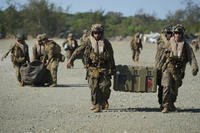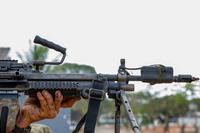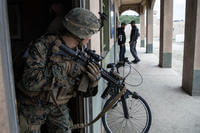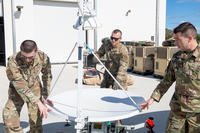Although there may not be any official word about this until next month, Monday's story in the New York Times is probably as good as an announcement: The U.S. is locked into Afghanistan for at least another 10 years.
After Kabul takes responsibility for the war next year, Washington will continue to fund, train and assist the Afghan National Security Forces as a "supportive ally," the Times reported, though there are few details yet beyond that basic commitment. The American and NATO officials quoted (anonymously) in the story painted it as a victory: It'll send a message to the Afghans that they're not being abandoned; tell the Taliban it can't wait out the international coalition; and signal Iran and Pakistan that the U.S. is not going to just pick up its marbles and go home -- again.
Afghan President Hamid Karzai has said before that he needed the West to cough up about $4 billion per year under the 10-year construct -- much of it will probably come from U.S. taxpayers. But after a war that has cost more than $8 billion per month, that level of funding would be a bargain at twice the price. And it would finally answer the question that no Bush or Obama administration official was ever able to: How will the Afghans afford their enormous new army after the U.S. and its allies withdraw? (At least it'll let the government give the answer everyone already knew: They won't.)
The new agreement with Afghanistan could be music to the ears of key Washington imperialists -- it could make it easier for the U.S. to maintain a strategic regional presence of the kind it gave up in Iraq, affording convenient bases for American airpower and special operators.
The devil, naturally, will be in the details:
Afghanistan's neighbors have spent years charging confiscatory rates to let the U.S. supply its forces there, so depending on the number of Americans who remain, the long-term deal may not be much of a bargain after all. Not only must the U.S. pay off everybody who gets a taste of the logistics network, but it will probably have to keep ready combat forces nearby just in case things go very bad in Afghanistan.
Which leads to the question: What tripwires would bring about American troops' involvement in potential flare-ups down the road? The Afghan forces must have at least the implied backing of American troops to make them a credible force. But American soldiers can't rush in like the cavalry to save the Afghans every time they get into a gunfight. Striking that balance will be one of the most important, and possibly most difficult, diplomatic jobs for the long-term transition.
On top of all the military and strategic implications for Afghanistan, the domestic fallout of Monday's deal also will be interesting to watch. President Obama has largely staked his political fortunes on promises to get the U.S. out of Iraq and Afghanistan -- Iraq is done, and the Afghanistan withdrawal is set up so that thousands of U.S. troops are home by Election Day. Committing the country to support Afghanistan for another 10 years could undercut that messaging, especially if voters don't want to get into the weeds about what constitutes a big combat presence vs. "support" for the ANSF.
Even before the election, Monday's story could wave another red flag in front of certain Republican bulls in Congress, whose blood is already up over perceived slights by the Obama administration. A few members worked themselves into a lather about not having been sufficiently consulted over Libya; or about the need for "international permission" for U.S. action in Syria; and now the executive branch could once again appear to be acting on its own. Some lawmakers want Americans out of Afghanistan yesterday. Some of them want to stay there for 50 years, not 10. If Congress doesn't feel like it was part of this agreement, look for another round of Libya-style outrage hearings.
In the final analysis, Washington had no good choices on Afghanistan. The White House probably hopes its agreement will give enough distance that most American troops can come home and force the Afghans to step up, as planned, but also keep Afghanistan close enough that it doesn't again offer a vacuum to be filled by terrorists. So after more than 10 years, all that's certain is that the next 10 years in Afghanistan will be critical.








